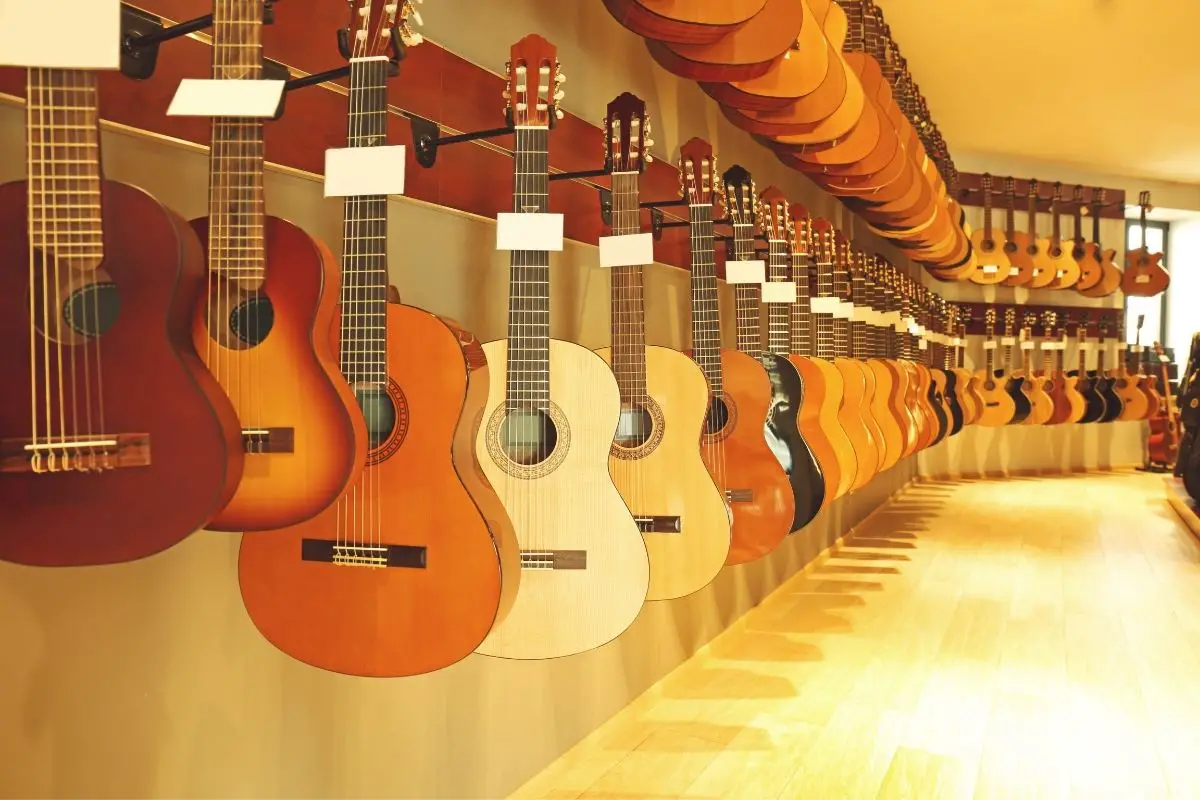Eric Clapton, an extraordinary figure in the world of music, began his journey with the guitar at a remarkably young age. His first encounter with the instrument was at the age of 13 when he received a guitar as a Christmas gift.
The early gift would mark the beginning of a lifelong passion and a career that would see Clapton become one of the most acclaimed and influential guitarists in the history of rock and blues.
This initial interest in the guitar soon turned into an absorbing pursuit as Clapton was drawn to the blues genre. By honing his skills and playing in local pubs, he quickly progressed.
By the age of 17, he joined his first band, the Roosters, marking the start of a professional music career that would lead him to play with several key bands before embarking on a successful solo career, creating a lasting impact on both the instrument and the music industry.
Key Takeaways on When Did Eric Clapton Start Playing Guitar?
- Eric Clapton started playing the guitar at 13 years old.
- He joined his first band at 17 years old, signaling the start of his professional career.
- Clapton’s career spans multiple bands and a successful solo venture, establishing his lasting legacy in music history.
Also don’t miss:
- Is Eric Clapton a Christian?
- Who Does Eric Clapton Think is the Best Guitarist?
- What Band Did Eric Clapton Play With?
Early Life and Initial Exposure to Music
Eric Clapton’s journey with the guitar began in his early years, deeply rooted in the rich soil of blues and rock music that emanated from his homeland, England.
Musical Roots and Early Influences
Eric Clapton was born on March 30, 1945, in Ripley, Surrey, England. His musical journey was influenced by blues from an early age as he immersed himself in the genre. This foundational love of blues would shape Clapton’s unique guitar style and his future contributions to rock music.
He spent countless hours listening to records, honing his skills by playing along, and capturing his progress on a portable Grundig reel-to-reel tape recorder.
The Formative Years
At sixteen, Clapton gained acceptance into the Kingston College of Art on a probationary basis. However, his focus on music over academia led to his dismissal. Undeterred, in 1962, at seventeen, he began performing in local pubs around Surrey.
It was during this period that Clapton joined his first band, the Roosters. His tenure with the Roosters was short-lived, but crucial, as he continued to mold his burgeoning musical style before moving on to become a member of the Yardbirds, furthering his legacy in rock and blues history.
Rise to Fame and Key Bands
Eric Clapton’s ascent in the music world was marked by his involvement with several influential bands. Displaying a profound talent for the guitar, Clapton’s journey through different groups helped solidify his reputation as one of the eminent guitarists of his time.
Breaking Out with the Yardbirds
Eric Clapton began his rise to fame after joining The Yardbirds in 1963, a band that also featured notable musicians like Jimmy Page. Recognized for his impressive guitar skills, Clapton’s time with the Yardbirds was a critical leap forward in his career, contributing to the development of the British blues sound.
Notably, Clapton played with them until his departure in 1965, objecting to the band’s shift towards a more commercial pop orientation.
The Creation of Cream

In 1966, Clapton embarked on a new venture, forming Cream with bassist Jack Bruce and drummer Ginger Baker. This trio became one of the first supergroups and was integral to the popularization of the blues-rock genre.
Songs like “Sunshine of Your Love” and Clapton’s powerful rendition of “Crossroads” are enduring examples of the band’s influence. Cream’s innovation in extended solos and virtuoso playing helped Clapton earn the moniker “God”.
Blues Breakers and Blind Faith
Before Cream, in 1965, Clapton joined John Mayall & the Bluesbreakers where his blistering guitar work on the “Beano” album deeply impressed the blues community. After Cream’s disbandment in 1968, Clapton formed Blind Faith with Steve Winwood of Traffic, Ginger Baker, and Ric Grech.
This band, however, was short-lived, releasing just one album before dissolving. Yet, in that brief period, Blind Faith managed to leave a mark on the rock landscape with their notable self-titled album and songs like “Can’t Find My Way Home”.
Solo Career and Notable Collaborations

Eric Clapton’s solo career is marked by a blend of blues and rock, with songs that have become anthems. He has participated in remarkable collaborations that complemented his prolific songwriting and masterful guitar playing.
Defining Moments as a Solo Artist
After forging a strong reputation in bands such as the Yardbirds and Cream, Clapton embarked on a solo career that would cement him as one of the pivotal figures in rock and blues.
His first solo album, aptly titled Eric Clapton, laid the groundwork for his seminal work, Layla and Other Assorted Love Songs, with the short-lived group Derek and the Dominos. The deeply personal album, fueled by his unrequited love for Pattie Boyd, featured the classic hit “Layla.”
Clapton’s distinctive style—a melting pot of his blues influences like Muddy Waters and Robert Johnson—shone through in his 1974 release, 461 Ocean Boulevard. The album showcased Clapton’s versatility and included a successful cover of Bob Marley’s “I Shot the Sheriff.”
His 1977 album Slowhand, which includes hits such as “Wonderful Tonight” and “Cocaine,” has become a staple in rock history. Following the tragic death of his son, Clapton released the touching ballad “Tears in Heaven,” further demonstrating his songwriting depth.
Partnerships with Other Legends
Clapton’s collaborations read like a who’s who of musical legends. He has played alongside Jimi Hendrix, appreciating and challenging each other’s artistry. His partnership with Duane Allman of the Allman Brothers Band resulted in remarkable guitar interplay, especially evident on the original recording of “Layla.”
He honored his blues heroes, recording albums with Freddie King and B.B. King, sharing his platform and his spotlight to showcase their talents. These collaborations not only paid homage to his roots but also brought the blues to wider audiences.
Clapton’s respect and reverence for his influences culminated in his inductions into the Rock and Roll Hall of Fame, an institution recognizing the contributions of the foremost artists in the industry.
Guitar Style and Legacy

Eric Clapton’s distinct guitar style and his legacy are unparalleled in the world of blues and rock music. His sound and technique have persistently influenced guitarists across generations, while his cultural impact extends beyond music into the essence of what many consider the epitome of guitar mastery.
Signature Sound and Technique
Eric Clapton’s guitar technique is characterized by his expressive vibrato, extensive bending, and fluid phrasing. His approach blends the emotive depth of the blues with the precision and clarity of rock, creating a signature sound that is both unique and immediately recognizable.
Over the years, Clapton’s gear, notably his Gibson SG and the Fender Stratocaster, have played a significant role in shaping his tone. With a trio, he could build an organic sound that allowed his guitar solos to resonate with emotion, as heard in classics like “Layla” and “Wonderful Tonight.” The use of the Crossroads guitar festival as a platform showcases his enduring connection to the roots of blues music while promoting guitar excellence across styles.
Impact on Music and Culture
As a solo artist, Clapton’s influence extends beyond his blues guitar prowess; he is often revered as a “guitar god.” His impact is deeply embedded in music culture, as he has continually brought blues music to new audiences, intertwining it with rock sensibilities.
World War II, Clapton’s legacy as an artist has helped to define the role of the guitarist in modern music, with a career that spans collaboration with the Yardbirds to his triumphant solo work. Through his involvement in events like the Crossroads Guitar Festival, he has fostered a community that reveres the guitar, not only as an instrument but as a bridge between various cultures and musical genres.
Frequently Asked Questions
Eric Clapton, acclaimed as one of the most influential guitarists, began his journey with the guitar at a young age and quickly established himself within notable bands, leaving a significant mark on rock music.
At what age did Eric Clapton start playing the guitar?
Clapton started playing the guitar at 13 years old, an age when many young musicians begin exploring their talents.
Which band was Eric Clapton’s first major group?
His first major group was the Yardbirds, a band he joined in 1963 and which played a critical role in the British blues movement.
What was Eric Clapton’s role in the Yardbirds?
In the Yardbirds, Clapton served as the lead guitarist, contributing greatly to their early blues-based sound.
How did Eric Clapton’s early career influence rock music?
Clapton’s early career, with his stints in bands like the Yardbirds and later Cream, was foundational in developing the blues rock genre, influencing generations of musicians.
What breakthrough performance established Eric Clapton as a guitar icon?
Clapton’s performance on the album “John Mayall & the Bluesbreakers with Eric Clapton” was a breakthrough that earned him widespread recognition as a guitar icon.
Which guitar is most associated with Eric Clapton’s early career?
The 1960 Gibson Les Paul Standard, often known as the “Beano” Les Paul, is famously associated with Eric Clapton’s early career, particularly during his time with John Mayall’s Bluesbreakers.








